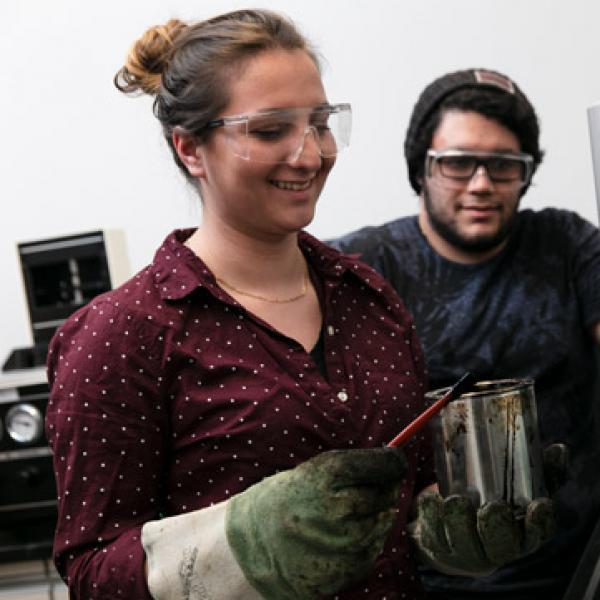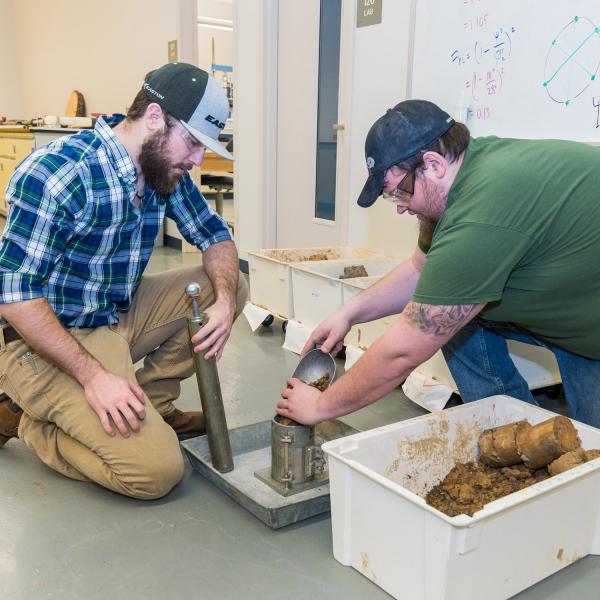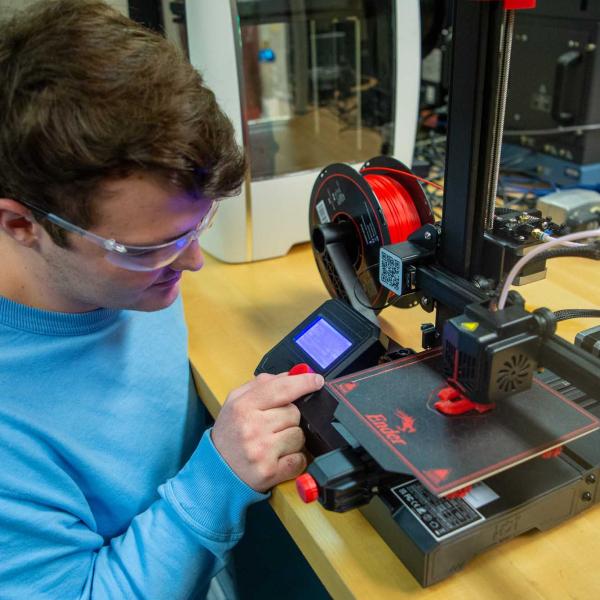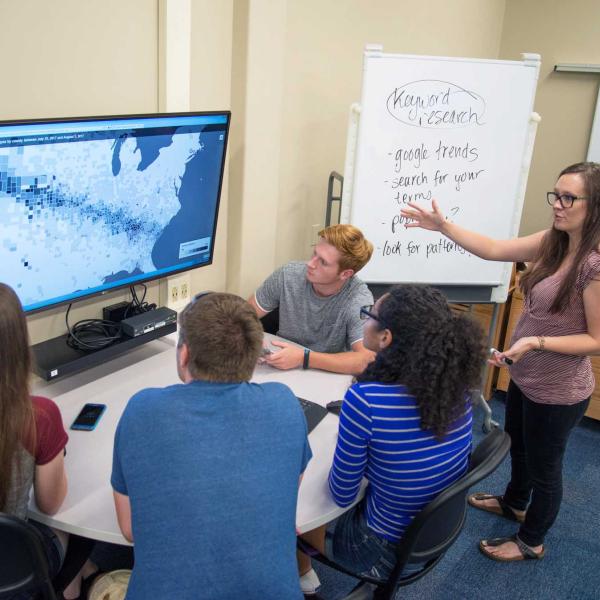Civil Engineering Technology

About this program
From the construction of a new park to the design of the city’s much-needed bridge, civil engineers know how to make it happen. Working out solutions to problems, and making recommendations along the way. In this Engineering Technology Accreditation Commission of ABET-accredited program, you’ll get hands on with the latest technology, hone your critical thinking skills, and take away the technical know-how to craft highways, structures, hydraulic systems, and development sites.
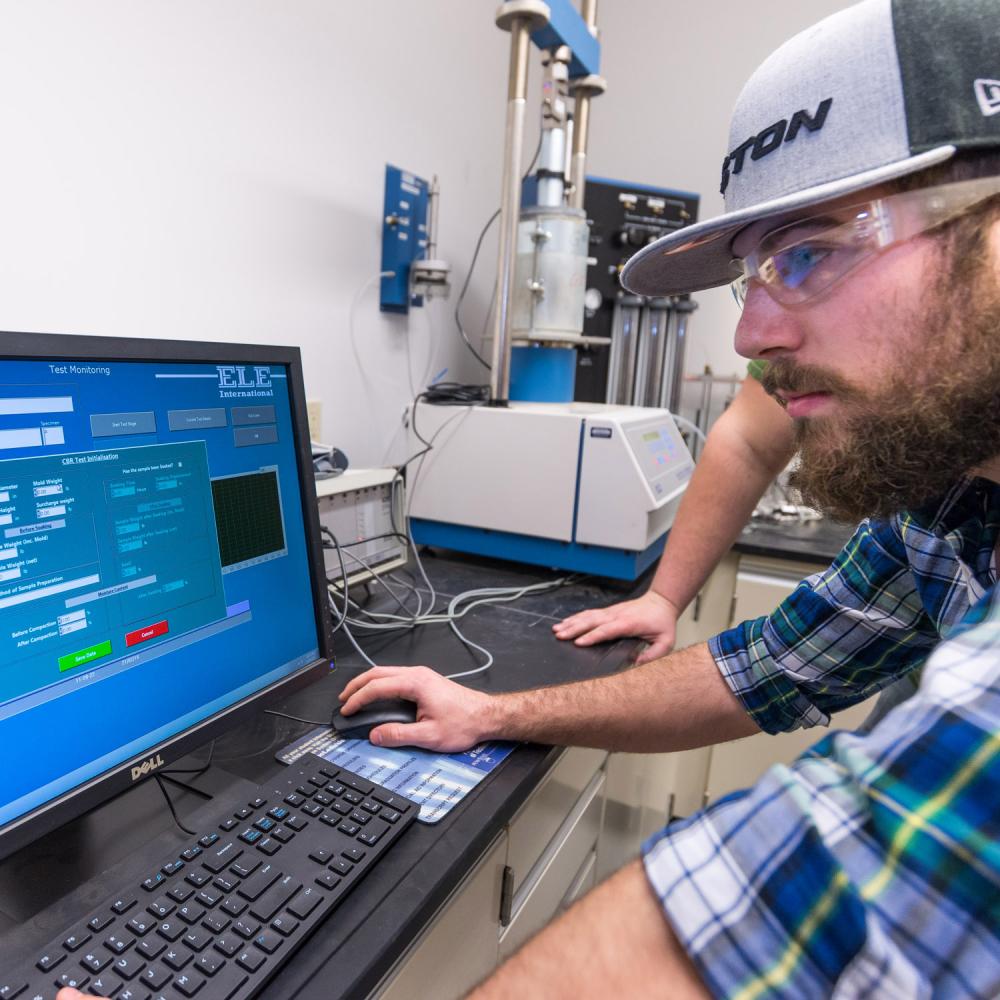
Careers
- Civil engineer designer
- Construction project manager
- Estimator/scheduler
Courses
At Penn College, we believe your educational experience should go beyond specialized skills. Real-world ready means taking a broader approach that builds communication skills, inspires collaboration, and encourages exploration of arts, history, and science.
Specialization requires in-depth knowledge and high-level proficiency. Students learn and apply major-specific concepts, skills, and methods.
- Surveying for Civil Engineers (CET160)
- Computer Applications for Civil Engineers (CET151)
- Erosion Control & Stormwater Management (CET120)
- Geographic Information Systems & Small Unmanned Aerial Systems (CET168)
- Engineering Mechanics I (CET203)
- Transportation Engineering (CET229)
- Origin, Distribution & Behavior of Soils (CET238)
- Engineering Mechanics II (CET213)
- Materials of Construction (CET246)
- Hydraulics & Hydrology (CET312)
- Fluid Mechanics (CET242)
- Structural Engineering I (CET305)
- Land Development for Civil Engineers (CET320)
- Structural Engineering II (CET315)
- Water Resources & Environmental Engineering (CET324)
- Civil Engineering Technology Elective (CET)
- Geotechnical Engineering (CET410)
- Sustainable Infrastructure (CET420)
- Senior Capstone Design-Planning (CET495)
- Design for Capstone Project (CET496)
Perspectives are points of view, offering a variety of ways of understanding, interacting, and influencing the world. Students identify, explain, and utilize the approaches used by academics and professionals to study, analyze, or understand problems, and offer solutions.
- Principles of Macroeconomics (ECO111)
- College Physics I (PHS115) or
- General Physics I (PHS201)
- College Physics II (PHS125) or
- General Physics II (PHS202)
- General Chemistry I (CHM111)
- Engineering Economics (MET315)
- Core Historical Perspective (HIP)
- Engineering Ethics & Legal Issues (MET321)
- Core Arts Perspective (ARP)
- Core Global & Cultural Diversity Perspective (CDP)
Next steps...
You're on your way to becoming a tomorrow maker.
Featured Videos
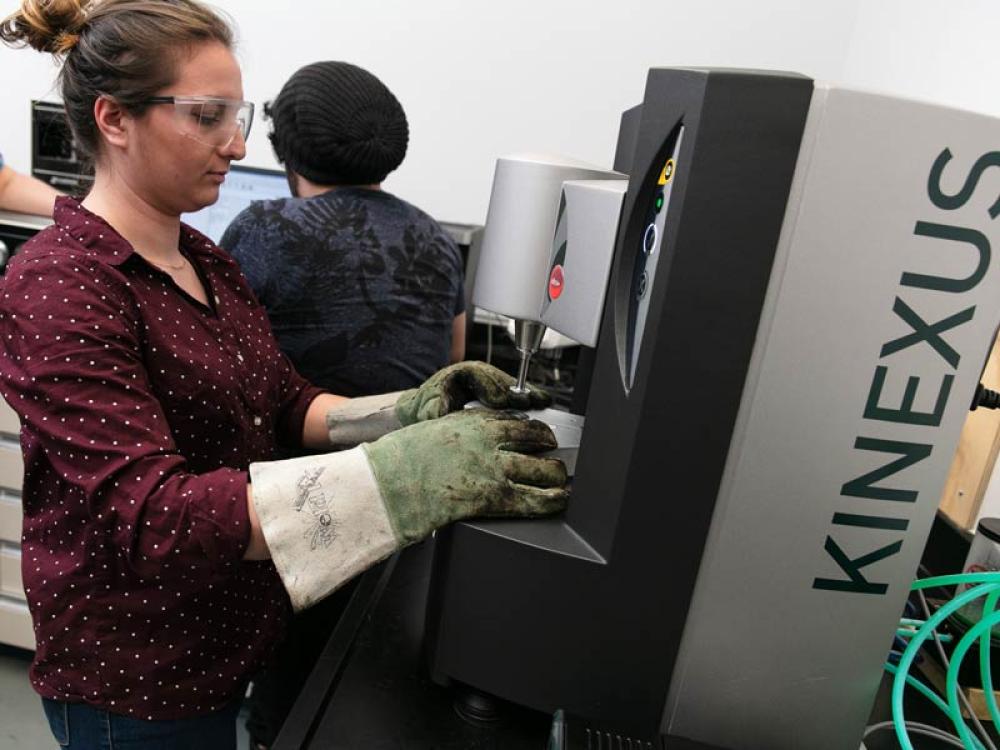
Facilities
Interactive, Hands-on Labs
- Geotechnical & Liquid Bituminous Materials Lab
- Sample Preparation Lab
- Shaker Room & Aggregates Lab
- Bituminous Mixtures Lab
- Concrete Compression & Utility Lab
Maker Profiles
Tour Schedule
Seeing is believing.
Think Penn College might be a good fit for you? Make plans to visit and discover what hands-on learning is all about.
More tour dates are on the way.
But let's customize a tour for you now. Call, chat, or email for options.
ABET-Accredited Program
Accredited by the Engineering Technology Accreditation Commission of ABET (www.abet.org ), under the General Criteria and the Program Criteria for Civil Engineering Technology and Similarly Named Programs.
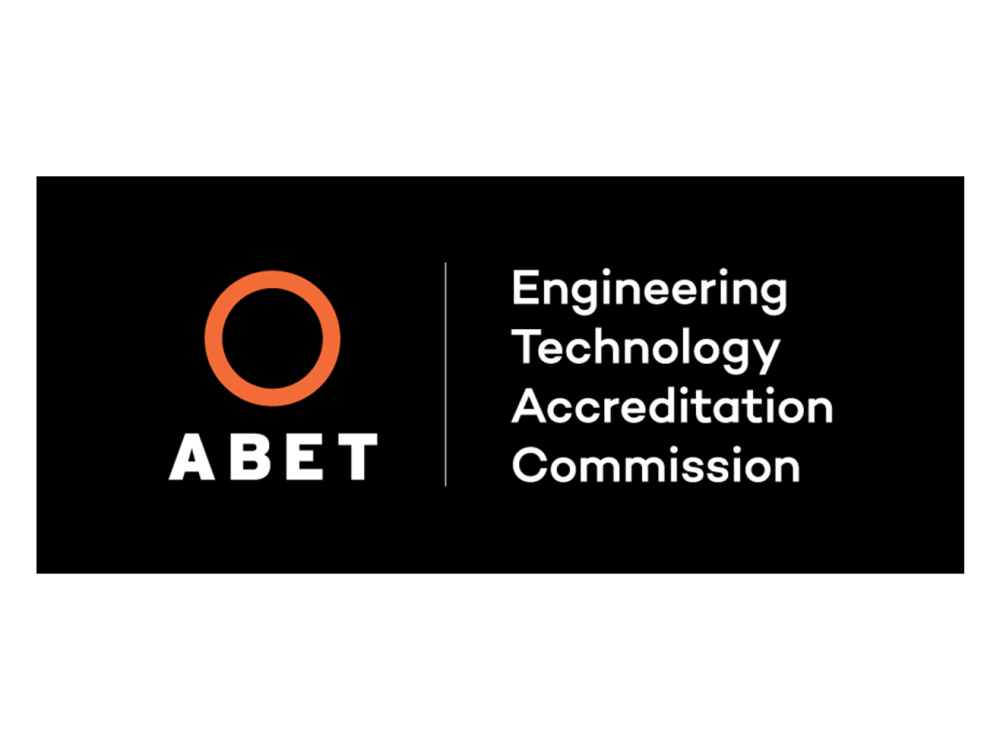
Internship
Your knowledge in practice
Internships are key for career preparation. Apply your knowledge to the workplace and learn about the industry first-hand.

Related Programs
Follow your passion
Student Life
Lead and put your skills to the test
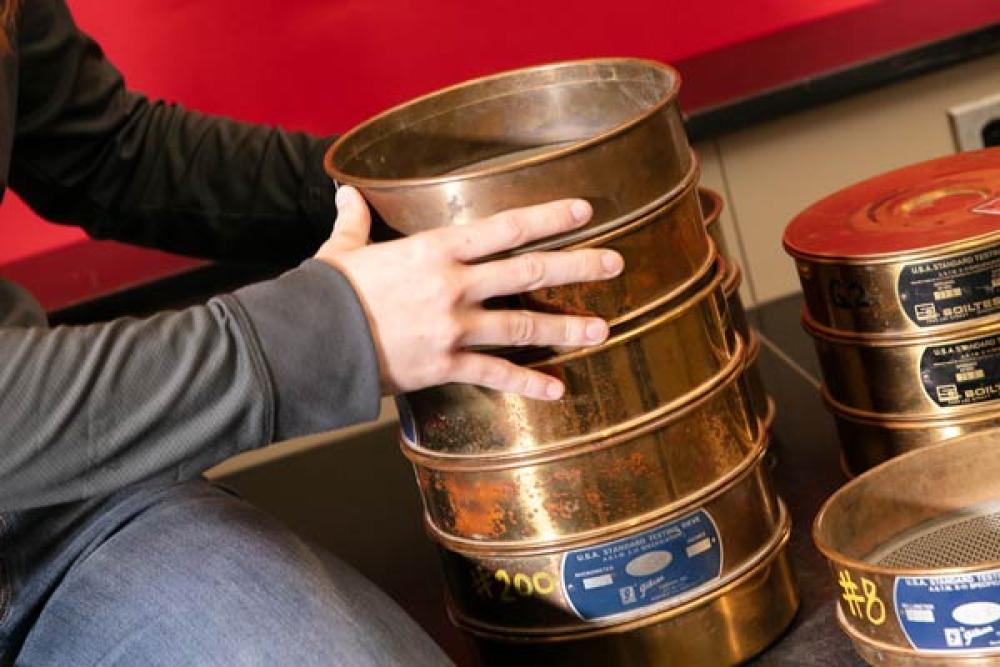
American Society of Civil Engineers (ASCE)
ASCE promotes an industrial knowledge of civil engineering, engages students outside of the classroom, and expands a positive recognition of the civil engineering profession.

Student Organizations at Penn College
Your college experience is about more than the classroom. Join one of 65+ clubs and organizations, or create your own.
Penn College News
Monday, March 31, 2025
PennDOT preps students on digital delivery
Monday, October 28, 2024
Two 'pop-up' employer info tables set this week
Monday, October 14, 2024
Students invited to HRG recruiting table

Study Abroad
Gain global experience
See the world via Williamsport. Take your education abroad and get hands-on experience learning about your industry on a global scale.
Student Experience
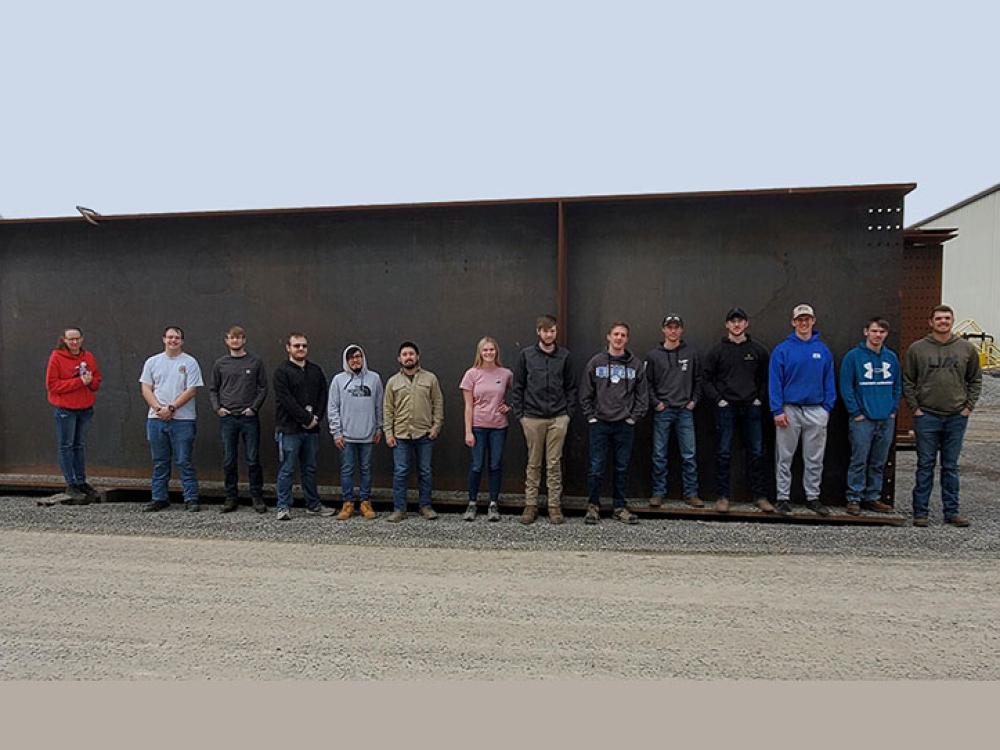
Real world applications
Students in the Steel Design course traveled to High Steel Structures LLC, one of the nation’s leading fabricators of structural steel, to learn about bridge girder fabrication. “The concepts students learn in my class are seen up close and very personal at High Steel Structures,” said Potts, assistant professor of civil engineering technology.
More Information
Accredited by the Engineering Technology Accreditation Commission of ABET (www.abet.org ), under the General Criteria and the Program Criteria for Civil Engineering Technology and Similarly Named Programs.
Program reviewers during the last ABET site visit suggested that there be a minimum grade requirement higher than “D” for the B.S. Civil Engineering Technology. Based on the department's qualitative data, most students have been able to achieve a minimum “C” grade in CET courses. A minimum grade requirement should provide incentive for underperforming students to take corrective measures or to consider alternative majors.
The following language for performance standards is to be added:
Students must complete all required major courses in the B.S. Civil Engineering Technology major (those with the alpha-designator CET) with a grade of "C" or higher.
This major is subject to the transfer standards established by the College (see https://www.pct.edu/admissions/transfer/transferring-credits). Exceptions must be approved by the school dean.
Alternative Credit refers to academic credits earned through means other than traditional college course completion, including: credit by exam, articulation, proof of competency gained in high school, work/life experience, and advanced placement.
Visit the Alternative Credit Options page for requirements and procedures and for information on credit through Advanced Placement.
Prospective students should be aware that licensure requirements for work in this profession vary by state. The Civil Engineering Technology program meets the educational requirements for licensure within the state of Pennsylvania. We have not determined if graduates of our program will be eligible for licensure in other states; therefore, students intending to seek employment in states other than PENNSYLVANIA are asked to contact the state licensing board of the state they wish to seek licensing to confirm that our program meets the requirements of the state where you intend to work. More information can be found on the the National Council of Examiners for Engineering and Surveying (NCEES) website .
Pennsylvania Professional Engineer (PE) Licensure
- Civil Engineering Technology B.S. students qualify to take the Fundamentals of Engineering (FE) exam — the first of two exams required for licensure in Pennsylvania — after achieving Junior class standing; however, it is recommended that the FE exam be taken during the Senior year.
- The second exam can only be taken after successfully completing the FE exam and gaining further work experience under the guidance of a licensed PE as stipulated by the registration law.
- Mr. Steven C Balkey, PE, Vice President, Project Development, Ameron Construction Co., Inc.
- Mr. John Nevin Blesh, PLS, '04, Surveyor/Data manager, Clinton County Solid Waste Authority
- Mr. Robert J Bradbury, Chief of Surveys, PA Department of Transportation District 3
- Dr. John Clune, Supervisory Hydrologist, USGS - Pennsylvania
- Dr. Jonathan U Dougherty, Corporate Recruiting, Providence Engineering
- Ms. Stefanie J English, PE, Project Manager - Structural Engineering, Larson Design Group
- Ms. Ashley Hetrick, EIT, '17, Land Development, Larson Design Group
- Mr. Thomas Holden, EIT, Civil Designer - Energy Services, Borton-Lawson Engineering
- Mr. Jacob Martin, EIT, '18, Land Development, RGS Associates
- Mr. Jay B Miller, Civil Engineer Manager - Construction Unit, PennDOT District 3-0
- Mr. Bryan Pauling, PE, Director, Energy Group, Larson Design Group
- Mr. Gerald C Wertz, P.E., Assistant District Executive - Design, PENNDOT
- Mr. Jeremy L Whitmoyer, PE, SE, Senior Structural Engineer, Larson Design Group
- Ms. Kelly Williams, '22, Survey Crew Chief, McClure
- Mr. Timothy Zeigler, PE, '14, Highway Designer, Gannett Fleming, Inc.

